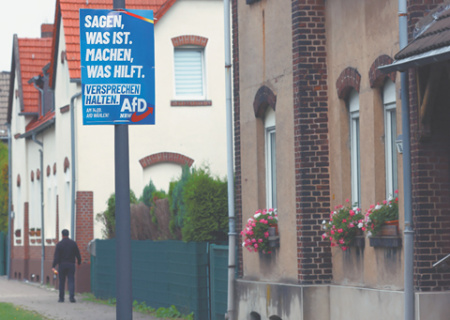
Germany’s center-right Christian Democratic Union (CDU) has emerged as the winner in municipal elections in North Rhine-Westphalia, the country’s most populous state. However, the vote was marked by a dramatic surge for the far-right Alternative for Germany (AfD), which secured a historic third-place finish in a result that signals a significant rightward shift in the nation’s political landscape.
The CDU secured 34% of the vote, while its federal coalition partner, the center-left Social Democrats (SPD), fell to second place with 22.5% in their traditional heartland. The AfD captured the spotlight by tripling its previous support to reach 16.5%. This success came largely at the expense of the Greens, who suffered a catastrophic loss, dropping 10 percentage points to just 11%. The liberal Free Democrats (FDP) also collapsed, polling a mere 3.5%.
Widely viewed as the first major electoral test for the national government in Berlin, the election was treated by experts as a crucial barometer of the public mood. The outcome is seen as a reflection of voter sentiment on federal economic and social policies, extending far beyond local concerns. With a voter turnout of just over 58%, the results nonetheless send a strong message to the national leadership.
The issue of migration was a dominant theme throughout the campaign and proved to be a decisive factor for a large segment of the electorate. The AfD’s hardline anti-migration stance appeared to resonate strongly with voters, fueling its significant gains. In contrast, parties perceived as more liberal on migration and integration, particularly the Greens who govern the state in a coalition with the CDU, faced a severe backlash at the polls.
The political shift was starkly illustrated in formerly staunchly center-left industrial cities like Gelsenkirchen, where the AfD emerged as the strongest political force. In a poignant display of local discontent tied to economic anxieties, some voters reportedly attended polling stations wearing old jerseys of the city’s football team, Schalke 04, featuring the logo of its former sponsor, Russian gas giant Gazprom, evoking a past era of perceived prosperity.
The AfD’s strong performance came despite recent high-profile controversies. Leading up to the vote, the party was beset by an espionage scandal involving a top candidate for the European Parliament and legal trouble for one of its most prominent regional leaders, who was fined for using a Nazi-era slogan. These events, however, did little to dissuade a growing number of voters from supporting the party.
In his assessment of the election, North Rhine-Westphalia’s Premier Hendrik Wüst (CDU) acknowledged the results indicated a clear “shift to the right in voter sentiment.” The outcome solidifies the AfD’s political weight in Germany’s industrial heartland and presents a formidable challenge for the established mainstream parties, which must now contend with the rising influence of the far-right.
